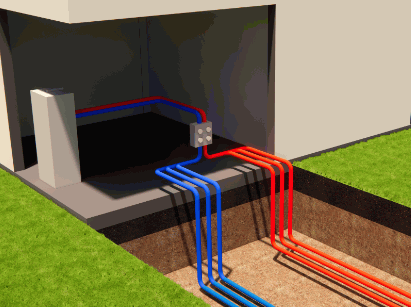If you’re searching for a way to heat your home efficiently and sustainably, then you may have heard of ground source heat pumps. These innovative systems tap into the natural warmth (geothermal energy) of the ground beneath your feet, providing a powerful and eco-friendly solution for your heating and hot water needs.
Ground source heat pumps, also known as ground-to-water heat pumps, are famous for their efficiency. By using a small amount of electricity, they can transfer heat from the ground – which maintains a constant temperature year-round – into your home central heating system, warming your radiators, underfloor heating, and even the water in your hot water cylinder. This not only keeps you comfortable but also helps the UK inch closer to its Net Zero Target by 2050.
Before investing in this brilliant renewable heating system, you’ll want to know more about it, and you can discover all you need to know with this Heat Pump Gang guide to the ground source heat pump.
Throughout this blog, we'll dig deeper into the world of ground source heat pumps, exploring how they work, the benefits they offer, and whether they might be the perfect fit for your home. So, get ready to discover a sustainable path to heating your home!
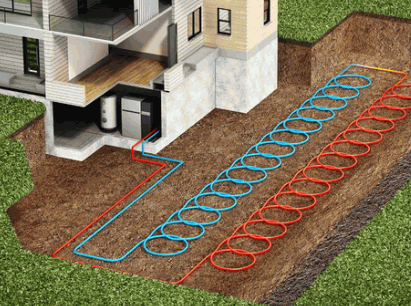
Ground source heat pumps are a relatively new innovation in home heating and cooling. Imagine a system that harnesses the Earth's constant underground temperature, a renewable source that stays remarkably stable throughout the seasons. This is exactly what ground source heat pumps do!
These clever systems rely on a network of pipes buried underground, either in trenches or vertical boreholes. Inside these pipes flows a liquid solution, often called brine (a mix of water and antifreeze), acting as a heat carrier. In winter, this brine acts like a sponge, absorbing warmth from the ground. The ground temperature, even in the UK winters, remains above freezing, providing a reliable source of heat.
But ground source heat pumps are more than just efficient heat collectors. They also come equipped with a built-in compressor. This clever device acts like a muscle, boosting the temperature of the captured heat from the ground. The hot brine is then passed through a heat exchanger, transferring the warmth to your home's heating system. This could be your trusty radiators, underfloor heating for ultimate space heating comfort, or even heat water stored in your hot water cylinder.
The beauty of these systems is their versatility. Come summer, the process simply reverses. The heat pump acts like a heat sink, extracting warmth from your home and transferring it back into the cooler ground. This keeps your living space pleasantly cool during the warmer months.
This means you don't need air conditioning units, so you save even more on energy costs!
There are two systems to choose from, and it’s vitally important that you are aware of the facts regarding these.
So, let’s examine the differences to clarify them before you commit to investing in a GSHP.
An open-loop system directly extracts groundwater, a naturally cool resource, from a local aquifer or well. This water passes through a heat exchanger, transferring its coolness to the GSHP system, before being discharged back into the ground.
Sounds efficient, right? Well, there are a few things to consider:
Instead of directly interacting with groundwater, these function in a self-contained circuit. A special water and antifreeze solution circulates through a network of pipes buried underground (horizontal trenches or vertical boreholes). This solution absorbs heat from the Earth and transfers it back to the GSHP unit for efficient heating or cooling.
Closed loops offer several advantages:
While open loops offer a direct approach, their environmental concerns and limited applicability make them a less favoured option. Closed loops, on the other hand, are the champions of efficiency, sustainability, and wider applicability. They're the clear winners for most GSHP installations in the UK.
If you're considering a GSHP, it's crucial to consult with one of our qualified engineers. They can assess your property, local regulations, and groundwater availability to determine the most suitable system for your needs. Remember, a GSHP is an investment in your home's comfort and efficiency, so choosing the right loop system is key to maximising its benefits.
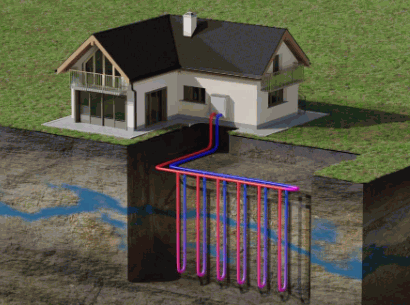
We've already touched on the topic of efficiency, but let's explore the full range of benefits that these amazing devices can provide...
Unlike traditional oil or gas boilers that burn fuel to generate heat, GSHPs tap into a free and endlessly refilling source - the Earth's constant underground temperature. This stable geothermal energy remains above freezing even in the chillier UK winters. By acting like a heat sponge, GSHPs effortlessly extract this warmth, significantly reducing the amount of energy required to heat your home compared to a boiler.
The GSHP uses a small amount of electricity to power a compressor, which acts like a muscle, boosting the captured heat from the ground to a higher temperature suitable for your home. It's like taking lukewarm water and turning it up a notch but with minimal additional energy input compared to the traditional method of directly generating heat through fuel combustion.
The beauty lies in the minimal energy used by the compressor. Because GSHPs are extracting readily available heat from the ground, they don't need to work nearly as hard as a gas boiler to keep your home warm. This translates directly to significant savings on your energy bills. Studies show that GSHPs can be up to four times more efficient than traditional boilers, leading to substantial reductions in your annual heating costs.
The efficiency of your heat pump depends on the actual source temperature of the heat energy. In colder conditions, your pump will need to put more effort in. That's why ground source heat pumps are often favoured over their counterparts that draw the heat from the air, as the ground temperature is more stable.
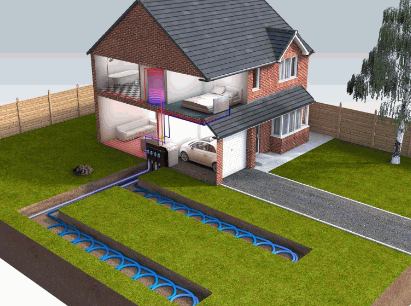
Unlike traditional boilers, which rely on the combustion of fossil fuels like gas or oil, GSHPs tap into a clean and renewable source – the Earth's geothermal energy. Using this naturally occurring and endlessly refillable source of renewable energy eliminates the need to burn fossil fuels, a significant contributor to greenhouse gas emissions and climate change.
By making the switch to a GSHP, you're actively reducing your reliance on fossil fuels and minimising your carbon footprint. As mentioned above, studies illustrate that a typical GSHP can achieve a staggering reduction of 3,000kg to 4,500kg of carbon emissions per year compared to a traditional boiler. That's the equivalent of planting hundreds of trees or taking several cars off the road!
As we strive towards a cleaner and more sustainable future, GSHPs offer a compelling solution. They promote energy independence from fossil fuels and contribute to a reduction in greenhouse gas emissions. By choosing a GSHP, you're not just making a smart financial decision, you're making a positive impact on the environment for generations to come.
Ground source heat pumps maintain a pleasant temperature in your home all year round. Here's how they achieved this remarkable feat:
During the colder months, GSHPs step up a gear, extracting the Earth's constant underground temperature through a network of pipes buried beneath your home. This stable thermal energy, even in the UK, remains above freezing, providing a reliable and free source of heat. The extracted warmth is then transferred into your home's heating system, keeping you warm throughout the winter.
When the sun gets a little too enthusiastic, and your living space starts to feel uncomfortably warm, GSHPs cleverly reverse the process. Instead of extracting heat from the ground, they act as heat sinks. They absorb excess warmth from your home and transfer it back into the cooler ground. This natural cooling effect helps regulate your indoor temperature, keeping you comfortably cool during the warmer months.
Unlike traditional systems that require separate heating and cooling units, GSHPs provide a single, integrated solution for year-round comfort. This eliminates the need for multiple installations and simplifies your home's climate control system. Imagine the convenience of having one system seamlessly switch between heating and cooling based on the season, all while maximising efficiency!
GSHPs are designed for durability and longevity. They boast a simpler design with fewer moving parts compared to traditional boilers. This translates to a lower risk of breakdowns and a longer lifespan for the system. You can enjoy years of reliable performance without worrying about constant maintenance needs and annual boiler checkups!
With a GSHP, you can focus on enjoying the comfort of your home rather than worrying about constant upkeep. The system operates efficiently with minimal intervention, allowing you to spend less time on maintenance and more time on the things that matter most.
Knowing that your heating and cooling system requires minimal maintenance is a weight off your shoulders. GSHPs offer peace of mind and the confidence that you can rely on a reliable system for years to come.
One of the often-overlooked benefits of ground source heat pumps (GSHPs) is their remarkably quiet operation. Unlike traditional boilers that can rumble and hiss, disrupting your peace and quiet, the GSHP's indoor heat pump unit operates with a whisper-soft hum. This translates to a more serene and comfortable living environment for you and your family.
Here's how GSHPs achieve this silent advantage:
Traditional boilers generate heat through combustion and various moving parts. These parts can create noise during operation, particularly when the boiler ignites or cycles on and off. GSHPs, on the other hand, use a compressor to boost the captured ground heat. This compressor operates with minimal noise, eliminating the disruptive sounds associated with traditional boilers.
GSHPs extract heat from the ground, a naturally silent source. This eliminates the need for noisy combustion processes that can generate significant sound within your home. Imagine the difference between a roaring fire and a gentle geothermal breeze – that's the quiet revolution GSHPs bring to your heating and cooling needs.
Whether you're relaxing in the living room, working from home, or getting a good night's sleep, GSHPs won't disrupt your peace with unwanted noise. This allows you to enjoy a more tranquil atmosphere in your home, free from the interruptions of a noisy boiler.
The quiet operation of GSHPs isn't just about comfort; it offers additional benefits:
Choosing a GSHP is like taking a breath of fresh air – not just literally, with its contribution to cleaner energy, but also figuratively, by eliminating the noise pollution associated with traditional boilers. It allows you to create a haven of peace and quiet within your home, a sanctuary where you can truly relax and unwind.

Ground source heat pumps can be a smart investment for your property's future. In today's increasingly eco-conscious market, installing a GSHP can make your home stand out from the crowd and potentially increase its value for several reasons:
Using cutting-edge technology to harness renewable energy, they showcase your commitment to innovation and sustainability. This can be particularly attractive to potential buyers who value modern and environmentally friendly features.
As environmental concerns rise, sustainability is becoming a major selling point for properties. A GSHP demonstrates your commitment to a greener lifestyle and reduces the home's reliance on fossil fuels. This eco-conscious approach can resonate with potential buyers who prioritise a sustainable living environment.
GSHPs are renowned for their energy efficiency, translating to significant savings on energy bills for homeowners. This is an attractive feature for many potential buyers who are looking for ways to save money on their running costs. Therefore, a GSHP can be a valuable asset, attracting buyers who appreciate energy-efficient features.
With increasing regulations and a push towards cleaner energy sources, homes that rely heavily on fossil fuels might become less desirable in the future. A GSHP future-proofs your property, ensuring it remains attractive to buyers who value sustainable and efficient solutions.
In a competitive market, any feature that makes your home stand out is a plus. A GSHP can be a major talking point during viewings, sparking interest in eco-conscious buyers and potentially widening your pool of potential purchasers.
Finally, studies suggest that homes with GSHPs can potentially sell for a higher price compared to those with traditional boilers. The combination of energy efficiency, sustainability, and future-proofing can be a valuable selling point, potentially increasing the overall value of your property.
Studies conducted by the Energy Saving Trust found that, on average, you can save between £1,000 and £2,200 per year compared with the annual costs of an oil/LPG/gas boiler, or electric heating system.
At the very least, you should see a saving of around £450 per year, although the actual amount you save will be determined by factors such as these:
It's always wise to consider the installation process of any home improvement or renewable energy system. Every project has its unique challenges, and all homes are different.
We'll run through the general process of a typical Heat Pump Gang heat pump unit installation to give you an idea of what happens...
This involves a qualified engineer visiting your property to assess your needs, heating requirements, and the suitability of your land for a ground loop system.
Based on the assessment, the engineer will design a GSHP system tailored to your home's specific needs. This includes determining the loop layout (horizontal trenches or vertical boreholes) and the size of the heat pump unit.
Depending on your location and the type of ground loop system chosen, you might need permits from local authorities before installation can begin.
The installation process can cause some disruption, particularly during the ground loop installation stage.
The installation time can vary depending on the complexity of the system and the chosen loop method. Horizontal loops might be quicker to install than vertical boreholes.
Ground source heat pump installation requires expertise and specialised equipment. Always ensure you hire a qualified and accredited heat pump installer to guarantee a safe, efficient, and properly functioning system. They will handle all aspects of the process, from initial consultation to final commissioning.
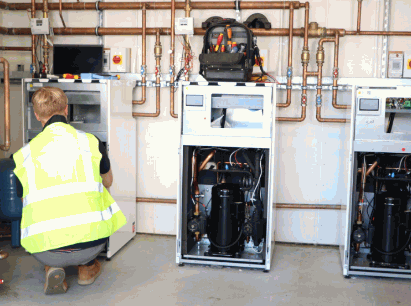
The total, including parts and installation costs, will probably be somewhere between £14,000 and £45,000.
As always, various factors will affect the cost, the main one being whether you have horizontal ground loops or vertical boreholes.
For example, vertical systems average between £17,000 and £45,000, while a horizontal system will sit between £14,000 and £32,000.
In comparison, air source heat pump installations cost, on average, between £8,000 and £14,000. This huge difference in price reflects the cost of excavation and laying the pipework for ground loop systems or digging boreholes for vertical systems.
Find out more: Ground Source Heat Pump Cost
At Heat Pump Gang, we realise that the cost of a GSHP might put many people off the idea. However, there is some good news on that score...
The recent introduction of the Heat and Buildings Strategy by the UK Government is a significant boost for ground source heat pumps. This strategy recognises the importance of clean and efficient heating solutions. Additionally, the government's decision to slash VAT on energy efficiency measures to 0% has made ground source heat pumps a more attractive option for homeowners.
There are also several grants you can take advantage of, such as the Boiler Upgrade Scheme (which replaced the Renewable Heat Incentive in 2022). You can find out more about available financial assistance on our blogs related to air and ground source heat pump funding schemes.
Uncover more: Ground Source Heat Pump Grants
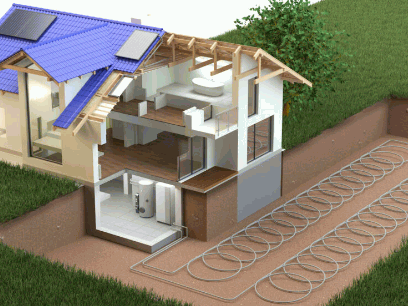
While the upfront cost of installing a ground source heat pump can be higher than a traditional boiler, the long-term benefits are undeniable. These systems boast impressive annual savings on your energy bills. More importantly, they significantly reduce your carbon footprint. Compared to a conventional boiler, a ground source heat pump can slash your carbon emissions by an astonishing 3,000kg to 4,500kg per year. That's a significant contribution to a greener and cleaner future!
For most consumers, this equates to a sensible and worthwhile long-term investment. This is especially so if you can secure funding to help with the costs.
On average, the initial installation costs can be recovered through energy savings within five to nine years, and potentially much sooner. Bear in mind that this doesn't take into account how much you save on repairs and maintenance for old heating systems that often let you down when you need them most!
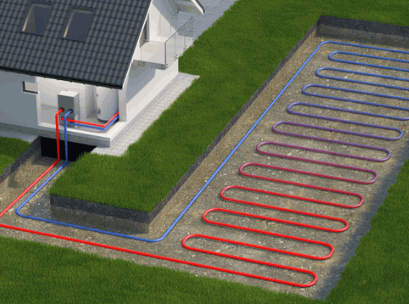
Air source heat pumps work on a similar principle, although they absorb heat energy from the air instead of the ground.
Both are excellent methods of reducing energy bills and cutting carbon emissions, but air-source heat pumps tend to be cheaper overall. This is because there's no need for trenches or boreholes, making the installation process quicker and simpler.
However, air source heat pumps rely on the outside air temperature throughout the year, which fluctuates greatly. Conversely, ground temperatures are relatively stable all year round, making the GSHP a more attractive and energy-efficient option for many homeowners.
Even so, practical considerations, such as the property's size and age, must be considered.
You can discover more information about the air source heat pump in our Heat Pump Gang blog on the subject.
Learn more: What Is An Air Source Heat Pump?
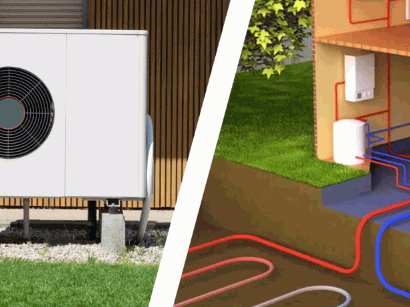
So, are ground source heat pumps the right choice? Maybe an air source heat pump might be a better fit for your circumstances. There's even a third option that we haven't explored: water source heat pumps.
But we're getting ahead of ourselves here! Water source heat pumps require a nearby body of water of an appropriate size. They are rare in the UK, so let's focus on summarizing the ground source heat pump to help you decide if it's the best choice.
So, here's a summary of everything you need to consider before you go ahead:
If energy efficiency, sustainability, and long-term comfort are priorities, then a GSHP could be a fantastic investment for your home. However, consulting with a qualified engineer to assess your property and needs is essential before making a decision. We can help you determine if a GSHP is the perfect fit for your home comfort journey.
